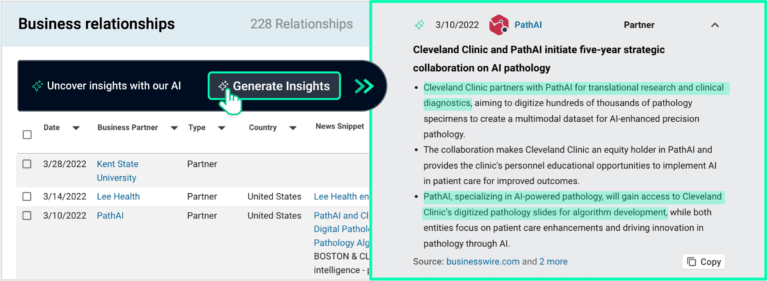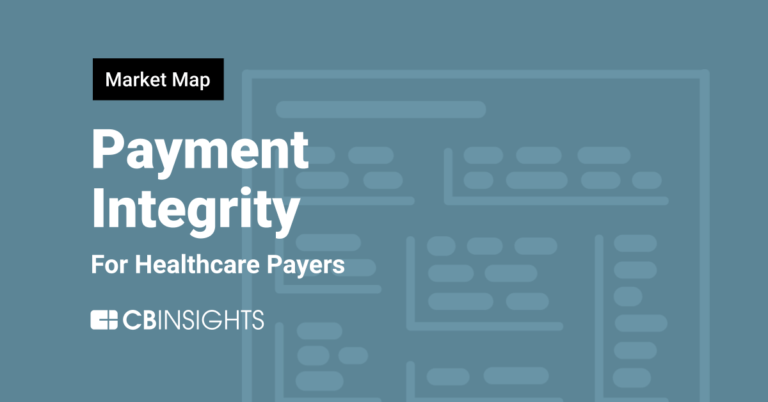
GYANT
Founded Year
2016Stage
Acquired | AcquiredTotal Raised
$29.21MAbout GYANT
GYANT provides healthcare services. The company helps patients through the complexity of their healthcare journeys. It develops digital front-door software and virtual assistants for hospitals and health systems to create better patient experiences, improve workflow, and reduce costs. The company was founded in 2016 and is based in Corte Madera, California. In January 2024, GYANT was acquired by Fabric.
Loading...
GYANT's Product Videos


ESPs containing GYANT
The ESP matrix leverages data and analyst insight to identify and rank leading companies in a given technology landscape.
The symptom assessment & triage platforms market utilizes digital tools to help patients assess symptoms and determine the appropriate level of care. These solutions can help reduce the burden on high-acuity and emergency services, improve access to reliable clinical advice 24/7, streamline patient journeys, increase provider productivity and quality, and save money by directing patients to the le…
GYANT named as Outperformer among 14 other companies, including Ubie, K Health, and Ada Health.
GYANT's Products & Differentiators
Front Door
AI virtual assistant to chat with patients or members on websites, mobile apps, or patient/member portals.
Loading...
Research containing GYANT
Get data-driven expert analysis from the CB Insights Intelligence Unit.
CB Insights Intelligence Analysts have mentioned GYANT in 2 CB Insights research briefs, most recently on Jul 15, 2024.

Expert Collections containing GYANT
Expert Collections are analyst-curated lists that highlight the companies you need to know in the most important technology spaces.
GYANT is included in 6 Expert Collections, including Value-Based Care & Population Health.
Value-Based Care & Population Health
1,069 items
The VBC & Population Health collection includes companies that enable and deliver care models that address the health needs for defining populations along the continuum of care, including in the community setting, through participation, engagement, and targeted interventions.
Conference Exhibitors
5,302 items
Digital Health 50
300 items
The winners of the second annual CB Insights Digital Health 150.
Digital Health
11,440 items
The digital health collection includes vendors developing software, platforms, sensor & robotic hardware, health data infrastructure, and tech-enabled services in healthcare. The list excludes pureplay pharma/biopharma, sequencing instruments, gene editing, and assistive tech.
Telehealth
3,122 items
Companies developing, offering, or using electronic and telecommunication technologies to facilitate the delivery of health & wellness services from a distance. *Columns updated as regularly as possible; priority given to companies with the most and/or most recent funding.
Artificial Intelligence
10,402 items
Latest GYANT News
Jul 25, 2025
European Business & Finance Magazine July 24, 2025 1 Physicians Assess AI Tools Against 12 Frontline KPIs; 8 Solutions Surpass Expectations in Diagnostic Alignment, Workflow Support, and Communication Quality NEW YORK CITY, NY / ACCESS Newswire / July 24, 2025 / As healthcare AI vendors race to promise autonomy in clinical decision-making and operational workflows, frontline clinicians are increasingly scrutinizing real-world performance. A new flash survey of 155 physician users conducted in July by Black Book Research finds that confidence in AI systems is being built or eroded based on measurable, testable outcomes rather than promotional claims. The survey builds upon recent benchmark studies, including “Toward the Autonomous AI Doctor,” which evaluated multi-agent AI against board-certified physicians in 500 urgent-care encounters. While that controlled study found AI aligned with clinician diagnoses in 81% of cases and treatment plans 99.2% of the time, Black Book’s new findings highlight substantial performance variation in commercial tools deployed in live clinical settings. 12 Clinician-Derived KPIs for Evaluating AI in Clinical Use Black Book Research team developed a proprietary framework of 12 Key Performance Indicators (KPIs) to measure real-world AI effectiveness. These KPIs reflect the needs of frontline physicians working in urgent care, telehealth, and primary care environments, and emphasize safety, operational utility, and integration readiness: Diagnostic Confidence Alignment – AI must reliably align with physician diagnostic reasoning. Treatment Plan Consistency – Recommendations should match physician-devised care plans. Safety Perception: Hallucination-Free Output – Systems must avoid generating unsupported clinical content. Clarity of Clinical Reasoning – Explanations must be understandable and reviewable by clinicians. Task Completion Without Human Override – Effective tools reduce the need for clinician intervention. Reduction in Administrative Burden – High-value AI streamlines documentation and routine tasks. Speed to First Clinical Action – Rapid, context-aware output is critical in time-sensitive care. Patient Communication Quality – Clear and actionable instructions for patients are essential. System Transparency and Auditability – Full visibility into logic, data sources, and outputs. Real-World Error Rate – Low mistake rates are foundational for ongoing use. Interoperability and Context Awareness – AI must integrate with clinical systems and adapt to patient context. Willingness to Delegate Tasks to AI (Task-Specific) – Clinician confidence enables autonomous task handling. __________ Eight AI Vendors Surpassing Clinical Performance Benchmarks Out of 41 commercial AI tools evaluated , eight vendors exceeded expectations in real-world clinical scenarios across multiple KPIs including user feedback: Ada Health – Strong diagnostic accuracy and auditability. Respondents noted Ada Health is particularly effective in autonomous triage and primary care support. Babylon Health – Recognized for fast clinical recommendations and administrative burden reduction. Praised by respondents for intuitive clinician interface and responsive output. Doctronic AI – A top performer in diagnostic alignment and treatment plan consistency. Clinicians reported minimal overrides and strong reasoning clarity. Gyant – Strong in automated intake, triage workflows, and EHR integration. Reduces friction in high-volume urgent care environments. Infermedica – High marks for clinical reasoning explainability and symptom-to-diagnosis mapping. Trusted for accuracy and low hallucination risk. Mayo Clinic Platform Well AI – Demonstrated low error rates, transparent logic, and seamless EHR integration. Backed by rigorous clinical governance. Nuance DAX (Microsoft) – Embedded in leading EHR systems. Recognized for significantly reducing documentation time while improving note accuracy. Suki AI – Voice-driven digital assistant that accelerates clinical documentation and said to enhance workflow efficiency, especially in outpatient settings. __________
GYANT Frequently Asked Questions (FAQ)
When was GYANT founded?
GYANT was founded in 2016.
Where is GYANT's headquarters?
GYANT's headquarters is located at 247 Chapman Drive, Corte Madera.
What is GYANT's latest funding round?
GYANT's latest funding round is Acquired.
How much did GYANT raise?
GYANT raised a total of $29.21M.
Who are the investors of GYANT?
Investors of GYANT include Fabric, Wing Venture Capital, OSF Ventures, AWS Healthcare Accelerator, Plug and Play and 17 more.
Who are GYANT's competitors?
Competitors of GYANT include Mountain, Clearstep, Hyro, Mediktor, Loyal and 7 more.
What products does GYANT offer?
GYANT's products include Front Door and 3 more.
Who are GYANT's customers?
Customers of GYANT include Edward-Elmhurst Health, OSF HealthCare, MemorialCare, Walmart Health and Adventist Health.
Loading...
Compare GYANT to Competitors

Hyro operates as a healthcare-focused company specializing in artificial intelligence (AI) powered communications. The company offers a platform that automates workflows and conversations for health systems, ensuring Health Insurance Portability and Accountability Act (HIPAA) compliance and integration across various channels such as call centers and mobile applications. Hyro serves the healthcare sector, providing solutions for patient interactions and operational processes. It was founded in 2018 and is based in New York, New York.

Mediktor provides an AI-based medical assistant for triage and pre-diagnosis in the healthcare industry. The company's main offering is an AI engine that guides patients to the appropriate level of care. Mediktor's solutions can be embedded into various interfaces and are utilized by health plans, hospitals, telehealth services, and pharmaceutical companies. It was founded in 2011 and is based in Barcelona, Spain.

Ada Health is a health technology company that focuses on symptom assessment within the healthcare sector. The company offers a symptom assessment app that provides users with health guidance, using clinical expertise and medical research. Ada Health serves the healthcare industry, including systems, providers, insurers, and other organizations. It was founded in 2011 and is based in Berlin, Germany.

Infermedica is a health tech company that provides AI-powered tools for the healthcare sector. The company offers a symptom checker and virtual triage system to assist patients in understanding their symptoms and identifying the appropriate level of care. Infermedica's solutions are used by various entities within the healthcare sector, including health plans, government agencies, healthcare providers, telemedicine platforms, and pharmaceutical companies. It was founded in 2012 and is based in Wroclaw, Poland.

Praktice offers healthcare analytics helping drive revenues and margins for hospitals and health organizations through critical insights. It was founded in 2018 and is based in Berlin, Germany.

Diagnostic Robotics specializes in healthcare technology with a focus on artificial intelligence and predictive analytics. The company offers solutions that utilize artificial intelligence and predictive analytics for healthcare providers and health plan administrators. Diagnostic Robotics serves the healthcare sector by delivering tools for population health management, patient navigation, and predictive modeling for care optimization. It was founded in 2017 and is based in Netanya, Israel.
Loading...

